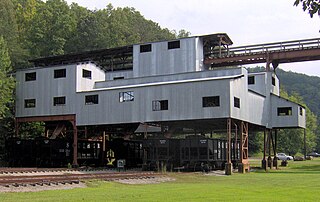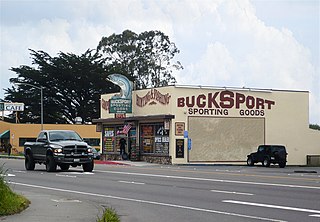
The Alabama & Gulf Coast Railway is a Class II railroad owned by Genesee & Wyoming. It operates 339 miles (546 km) of track from the Pensacola, Florida export terminals, west of downtown, north to Columbus, Mississippi, with trackage rights along BNSF Railway to Amory, Mississippi. A branch uses trackage rights along Norfolk Southern from Kimbrough, Alabama west and south to Mobile, Alabama, with separate trackage at the end of the line in Mobile.

Muscogee is a ghost town located twenty miles northwest of Pensacola, Florida, United States, in Escambia County, along the Perdido River. Named after the Muscogee Lumber Company, formed by Georgia lumber men, the town was founded in 1857 by a group of lumbermen to harvest timber from the surrounding pine forests. They and the following company clearcut the timber, and once the forests were gone, lumbering ended in this area.

The Sumpter Valley Railway, or Sumpter Valley Railroad, is a 3 ft narrow gauge heritage railroad located in Baker County, in the U.S. state of Oregon. Built on a right-of-way used by the original railway of the same name, it carries excursion trains on a roughly 5-mile (8.0 km) route between McEwen and Sumpter. The railroad has two steam locomotives and several other pieces of rolling stock. Passenger excursion trains operate on weekends and holidays from Memorial Day through the end of September.

Truman Heminway Aldrich was a civil engineer, a mining company executive, and a paleontologist, and briefly served in the United States House of Representatives and as Postmaster of Birmingham. He is the sole Republican ever to represent Alabama's 9th congressional district, which existed from 1893 to 1963. His brother William F. Aldrich also represented Alabama in Congress, serving three partial terms during 1896–1901 from Alabama's 4th congressional district.
Swiss is an unincorporated community in western Nicholas County, West Virginia, United States. Its elevation is 735 ft (224 m).

Blue Heron, also known as Mine 18, is a former coal mining community or coal town on the banks of the Big South Fork of the Cumberland River in McCreary County, Kentucky, United States, that has been recreated and is maintained as an interpretive history area in the Big South Fork National River and Recreation Area.
The Pine Belt Southern Railroad was a shortline railroad formerly operating on two disconnected track segments in east central Alabama. Upon its start in 1995 the railroad ran over a branch from Nuckols to Hurtsboro, Alabama. In 1996 a second branch was acquired, extending from Roanoke, Jct., near Opelika, to Lafayette, Alabama. Together the lines totaled 42.4 miles (68.2 km) and the railroad was controlled by Richard Abernathy.

Bucksport was a town in Humboldt County, California. The original location was 2.5 miles (4 km) southwest of downtown Eureka, on Humboldt Bay about 5 miles (8 km) northeast of entrance. at an elevation of 16 feet (4.9 m). Prior to American settlement a Wiyot village named Kucuwalik stood here.

Hannibal is an unincorporated community located in Taylor County, Wisconsin, United States. Hannibal is located on Wisconsin Highway 73 and County Highway M north of Gilman, in the town of Cleveland. Today Hannibal is quiet, but once it was a bustling little economic hub at the junction of two logging railroads.
Nallen is an unincorporated community in Fayette and Nicholas counties, West Virginia, United States. Nallen is located along West Virginia Route 41, 12 miles (19 km) south of Summersville. Nallen has a post office with ZIP code 26680.
Nahant or West Nahant is a ghost town in Lawrence County, South Dakota, United States. It flourished as a logging and, to a lesser extent, mining town in the late 19th and early 20th centuries.
Black Rock is an unincorporated community and former logging camp in Polk County, Oregon, United States. It is located about three miles west of Falls City, in the Central Oregon Coast Range on the Little Luckiamute River.
Manistee is an unincorporated community in Monroe County, Alabama, United States. Manistee was a logging town, and was home to the Manistee Mill Company, Bear Creek Mill Company and Runyan-Burgoyne Lumber Company. The Manistee Mill Company built a spur track to connect the sawmills of Manistee with the Louisville & Nashville Railroad in Repton and named it the Manistee & Repton Railway. The railway began operations in 1907 and remained in use until the 1970s, operating over 45 miles of track. Amasa Coleman Lee, father of Harper Lee, served as financial manager for a Monroeville law firm's interests in the Manistee & Repton Railway. A post office was operated in Manistee from 1892 to 1912.
Tecumseh Furnace is an unincorporated community in Cherokee County, Alabama, United States.
Hybart is an unincorporated community in Monroe County, in the U.S. state of Alabama. Hybart is located at 31°49′36″N87°22′56″W. It is located at the intersection of Alabama State Route 41 and Monroe County Road 56, in the northwestern part of Monroe County, just a short distance from its border with Wilcox County, Alabama. Hybart is the host of a locally famous Alabama turkey hunting competition called the Butterball which has appeared in Mobile Bay Magazine. The area is also known for being a good hunting spot for whitetail deer, turkey, quail, dove, and duck. Hybart is on the northwestern edge of the Red Hills region of southwestern Alabama, a hilly, wooded, and still largely undeveloped part of the state, geologically distinct from the Gulf Coastal Plain to its south, and the Black Belt region to its north. Within the Red Hills region, the Forever Wild Land Trust of Alabama owns two large tracts of land a few miles to the southeast of Hybart. Recreational opportunities in these tracts include hunting, woods road hiking/exploration, wildflower viewing, photography, and bird and wildlife watching. The Red Hills tracts are open to visitors year-round.

Millview is an unincorporated community located along Perdido Bay in Escambia County, Florida, United States.

Norfield is an unincorporated community in Lincoln County, Mississippi, United States.

Millwood was a lumber boomtown located in present-day Sequoia National Forest near Converse Basin Grove in California. It was established in 1891 by the Kings River Lumber Company and was connected to the Sequoia Railroad, which brought logs to the town to be turned into rough lumber. The lumber was then transported by log flume to Sanger, a journey of 54 miles. At its peak, Millwood had a population of over 2,000 people and featured two hotels, a summer school, and a post office. However, today there are no remaining structures or buildings at the Millwood site.











